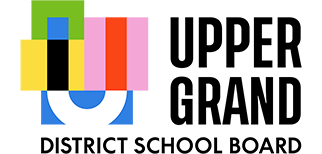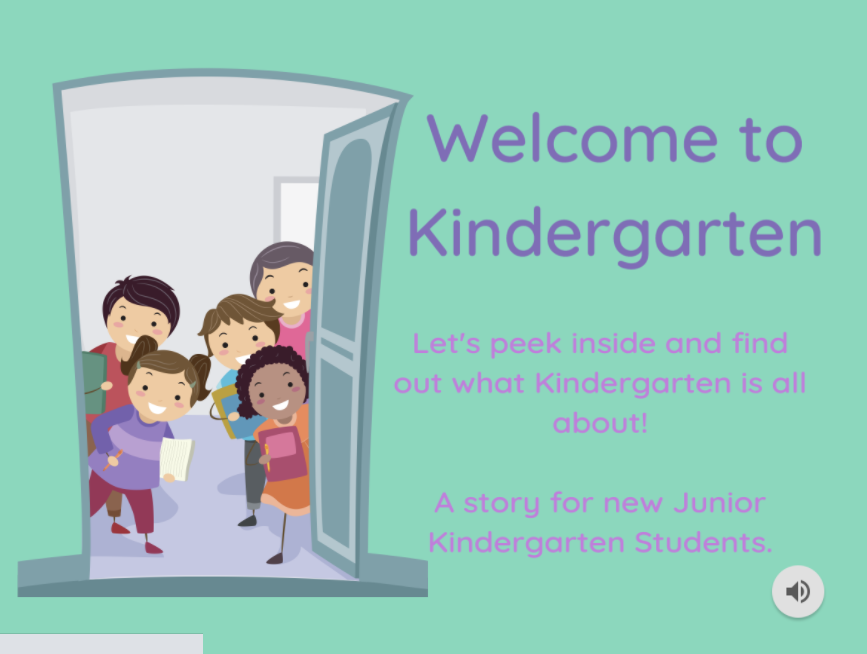Getting Ready for School
Welcome to Kindergarten!
Starting Kindergarten is an exciting time for both you and your child. We can’t wait to welcome your child into our caring school community. We hope that the information here will help you prepare for this next big milestone, Kindergarten.
Click on the image to see the presentation.
Getting Ready for Kindergarten
As families prepare for this exciting next step with their child, they often ask how can they can help their child get ready for school? Here are some steps families can take to help support a smooth transition to Kindergarten.
TALK AT HOME
Speaking and listening is key in supporting a child’s literacy development. You may enjoy asking questions about their day, who they played with and what they did and can extend conversation with questions like “what did you do before that happened/after that happened?” You could share about your day as well and encourage your child to ask you questions too.
If you speak languages other than English at home, we encourage you to engage with your child in those languages as well. Oral conversations and stories in our first language should be celebrated and shared as they support a child’s literacy and personal development.
BUILD RELATIONSHIP SKILLS
Young children enjoy playing games and activities and will benefit from opportunities that require sharing, giving and receiving different opinions, waiting their turn, and new ways of doing something. You may want to include a variety of activities that include both active and pretend play. Providing opportunities to develop problem solving skills and recognizing ways to manage stressful moments also supports a child’s early social and emotional development (for example, counting to 5, deep breathing).
READ, READ, READ
Children love to engage with stories. They do this in lots of ways, some love to look at pictures, some like listening, and others love to make up their own stories as they flip the pages in a book. Sharing a book or a story with your child is a great way to spend time together. You may want to try to make this part of a daily routine. If your family has books and stories to share in other languages you are encouraged to share these with your child as well.
Children at this age often enjoy drawing and writing. Writing at this stage may just look like scribbles on a page, but it has meaning to them and this is a great place to start. Children also enjoy sharing their stories and pictures (even if they are still making it up). This sharing helps to encourage them to keep building this skill.
MATH
Playing games helps to build math skills. Turning everyday activities in to math moments, like counting spoons at the dinner table our counting number of stop signs on a family walk can be
fun ways to build these skills with your child.
BUILD BIG AND SMALL MOVEMENT SKILLS
Children at this age often love running, jumping, skipping, hopping, and throwing balls. You can help them to build on these big movement skills by providing opportunities and teaching safe times and spaces to do so.
Children can build their small movement skills through fun activities like using tweezers to pick up small objects, cutting safely with scissors, pouring water, using Playdoh, and using various materials to colour, draw and trace.
FOSTER INDEPENDENCE
At this age children are ready to begin to learn more independence. You can help your child by offering opportunities and celebrating their attempts at independence (such as doing up zippers, putting on shoes and coats, and opening snack containers.)
Often times children are still building independent toileting skills in the months prior to, and starting kindergarten and many parents share concerns about this. Rest assured we will work with you to develop a plan to best support your child. Consider these strategies as you help your child build these skills.
- Work towards using the washroom independently—flush the toilet and wash hands
- If your child is not yet completely toilet trained, please help them learn to independently pull down/up their pants and underwear and change themselves
- Pull up diapers are strongly recommended for children who are not fully toilet trained. Educators are not available to change diapers, however they will support them by coaching through the steps. If you have any concerns or questions, please speak to your child’s teacher or ECE.
- Accidents happen even when children are using the toilet independently. Please send a change of clothes, including underwear
Some other helpful tips to practice closer to starting school:
- Practice packing and unpacking their backpack—provide a backpack that will hold a lunch kit, library books, change of clothes, and school work
- Practice independently unpacking his/her snacks, lunch bag
- Practice opening lunch containers
- Practice walking to school or to the bus stop often, so it begins to feel like a familiar routine
- Attend the bus orientation and go over the bus safety rules a few times, if your child will be riding the bus
- Practice arrival and dismissal routines (find out routines from the educators)
- Begin getting your child and yourself used to the bedtime and wake-up schedule that will be required during school
- Children between the ages of 3 and 6 years benefit from approximately 10 to 12 hours of sleep per night
- Both the amount and quality of sleep your child gets will influence his or her learning
- Ensure that your child knows how to tell adults and other students about any allergies (e.g. peanuts) or food restrictions he/she may have. (e.g. I can’t eat nuts. They make my tummy sick). Be sure you have informed the school as well and completed a plan of care form.
- More than ever we understand the importance of daily safety & hygiene routines. Practicing these two key routines at home will support your child in their transition to Kindergarten.
DAILY SCHOOL SAFETY ROUTINES FOSTER INDEPENDENCE
Hand Hygiene – students will be supported to engage in routine hand washing and the use of hand sanitizer. Hand hygiene will be practiced upon entry into the classroom, before and after eating, following washroom use, prior to moving into a new learning space within the classroom and prior to exiting the classroom.
Cough & Sneeze Etiquette – students will be taught and coached to cough and/or sneeze into their elbow and to use a tissue to blow their nose. Students will be coached to enjoy their own food. No sharing.
*Our safety routines follow the guidelines established by Public Health. Should masks continue to be required or other safety routines ad added or adjusted we will be sure to share these with the school community. For more information about school protocols from Public Health click here.
What does my child need for kindergarten?
- Choose clothes, jackets, shoes and boots that are easy for your child to put on, take off and fasten by him/herself. Spend time practicing with him/her
- Kindergarten children learn best when they are exploring, discovering, experimenting – in other words, getting messy…you may wish to choose clothes for your child that are easy to clean.
- Outdoor play is an important part of the Kindergarten Program. Your child will benefit from outdoor clothing for all types of weather. For example, a dry set of clothes, rain boots, hats, snow pants, jackets, extra mittens and socks.
What foods should I send with my child?
Snack and lunchtime are an important part of the kindergarten program. Young children love to socialize with each other while they eat their snacks and lunch. Please send your child’s snacks and lunch in containers that they are able to open by themselves. Kindergarten students are provided with extra time to eat, but please don’t be surprised if they don’t finish all you send in the beginning. They will be encouraged to eat and provided multiple opportunities throughout the day.
Where ever possible it is suggested that children bring light, healthy snacks and food they enjoy.
- Multiple small portions or snacks that can be eaten across the day are often beneficial to start kindergarten i
- Fruits and vegetables, yogurt, hummus, or whole grain crackers and cheese would be considered a great snack
- Your child’s teacher or ECE will inform you about any food restrictions based on the allergies or sensitivities of other children in the class.
For more information on healthy snacks:
• Wellington/Dufferin Public Health
• Canada’s Food Guide
What if I am having concerns about my child’s adjustment to school?
- Remember, children develop and adjust differently – some children require more time and support than others
- Talk to your child’s teacher or ECE. The teacher and ECE want to hear your concerns and to work with you to support your child.
Resources:
- Wellington Dufferin Student Transportation Guide, FAQ’s for Parents
- Student Transportation Website
- UGDSB Before &/Or After School Programs
- A Parent’s Guide to Full Day Kindergarten
- A Parent’s Guide to Literacy and Math in Kindergarten
- A Parent’s Guide to Full Day Learning in Kindergarten
- “The Kindergarten Program, 2016” Curriculum Document
- Information on Toilet Learning from Public Health Wellington-Dufferin-Guelph
- Teaching your child to become independent with daily routines
- Teaching your child to cooperate with requests
- Moving On To School


